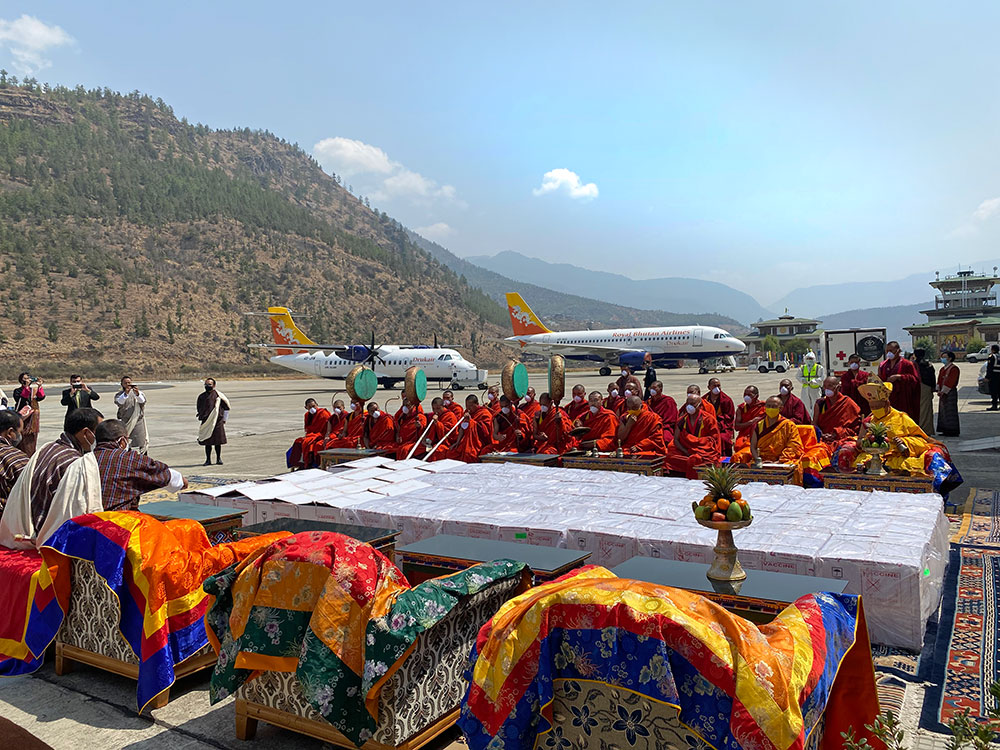An epidemiologist credits Bhutan’s success in large part to divine intervention
Younten Tshedup
Covered in white plastic wrap and stored in temperature-controlled boxes, the Covid-19 vaccines might be the only medicinal drug to have received one of the highest and most ostentatiously religious receptions in the country.
This was because of the important role vaccines played in controlling the pandemic, which was, and still is, wreaking havoc around the world. But besides the vaccines, many laud the role of the religious body in the fight against the pandemic as exemplary.
Series of rituals and religious ceremonies including kurims to contain and pacify the pandemic started as early as March 2020, just when the country was beginning to see positive cases.
Led by His Holiness the Je Khenpo, the first-ever initiation of Sangay Menlha (Medicine Buddha) over the TV and social media platforms was conducted on March 20.
“As a Buddhist, it is this belief in religion and God that helps guide us when nothing seems to work,” said a health worker, adding that when all things fail, people should trust in the divine. “This is exactly what we did in Bhutan.”
Science vs the Divine
Assistant Professor of Epidemiology with the Khesar Gyalpo University of Medical Sciences of Bhutan (KGUMSB), Dr Sithar Dorjee, opined that although no scientific data was collected or hypothesis tested, he believes divine intervention has helped the country endure the pandemic without many challenges.
“I’m a scientist but I absolutely believe that our success so far in controlling the pandemic is a combined effort of science and divine intervention,” said Dr Sithar Dorjee.
The epidemiologist said that there were multiple incidences where science could not explain certain events that were happening in the country. The Gelephu case that triggered the first nationwide lockdown last year had tested positive approximately 65 days following the exposure to the virus. “The Technical Advisory Group was certain that the woman had recovered and what she tested positive for was the remnant virus.”
However, Dr Sithar said that given the uncertainties surrounding the virus then, the technical advisory group (TAG) recommended imposing the lockdown. “It was during this lockdown where we actually detected active transmission of the virus in the south. So, our first case was not the woman from Gelephu. But she was the one who alerted us on time and helped prevent further spread of the virus.”
In another incident, Dr Sithar said that Bhutan accidentally received personal protective equipment (PPE) that was meant for another country. This was during a time when PPEs and face masks were running short globally. “It’s the same with the vaccine. While the world is struggling with vaccine shortages, we have achieved one of the highest vaccine coverages in the world today.”
He added that having cabinet ministers with medical and epidemiological backgrounds during a time when the world had to battle a public health emergency is, in itself, divine intervention. “Having a prime minister and health minister who come from the same background and who know the subject better means things become much easier for people like us.”
Above all, Dr Sithar said that it was His Majesty The King’s personal effort since the very beginning that has kept Bhutan ahead of the pandemic. “His Majesty has always been there, guiding with his farsightedness and extraordinary leadership. The divine intervention that we talk of comes from His Majesty, as he has demonstrated insight far beyond regular humans like us.”
He said that when His Majesty The King ordered the closing of the southern borders last year, the TAG had not even considered any such decisive decision at that point. “If not for His Majesty’s farsightedness, we would have been in a different situation now,” he said. “So, in these ways, although not scientifically proven, divine intervention has been playing a major role in Bhutan for ages. That is why we have to keep praying and not lose faith in the divine.”
The epidemiologist, who otherwise is an ardent advocate of facts and figures, said that divine intervention can be as simple as remembering something important after praying, which otherwise might have been overlooked in the process. “This is something hard to scientifically prove, but then again, we don’t have to prove anything. I truly believe there is divine intervention at work here.”
Edited by Tshering Palden


